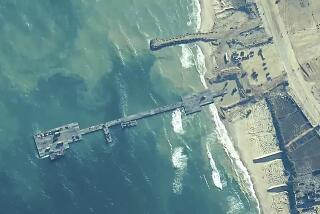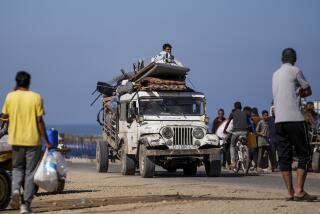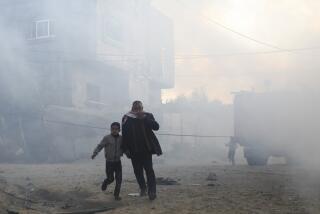Pakistan reopens border crossing to NATO trucks
- Share via
Reporting from Islamabad, Pakistan — Pakistan on Sunday reopened a border crossing used to ferry fuel and supplies to NATO troops in Afghanistan, ending an 11-day ban imposed after a NATO helicopter incursion that killed two Pakistani troops.
The first of hundreds of trucks and tankers stranded since Sept. 30 began moving through the Torkham checkpoint at the Khyber Pass early Sunday afternoon.
Militants had exploited the bottleneck to launch attacks across Pakistan on tankers and trucks carrying NATO supplies. More than 150 trucks were set ablaze or damaged, and at least six people were killed.
Pakistani officials made the decision Saturday, four days after the U.S. government and NATO apologized for the deaths of the Pakistani soldiers. They said the helicopter crews mistook them for insurgents they had been pursuing across the Afghan-Pakistani border.
Although U.S. officials hailed the reopening as a welcome development, relations between Islamabad and Washington remained tense. The attack NATO helicopters was seen in Pakistan as a violation of the country’s sovereignty. It came at a time when the United States has dramatically stepped up its drone missile strikes against Taliban and Al Qaeda militants hiding in Pakistan’s largely lawless tribal areas along the border with Afghanistan.
In September, the United States carried out 22 drone missile strikes in Pakistan’s tribal areas, most of them directed at the Afghan Taliban wing known as the Haqqani network in the North Waziristan region. Haqqani fighters use Pakistani territory as a base for launching attacks on U.S., NATO and Afghan forces in Afghanistan, but Pakistan has balked at moving against them.
Pakistan plays a vital role in keeping supply lines open for U.S. and Western troops battling Taliban insurgents in Afghanistan. About 40% of the North Atlantic Treaty Organization’s non-weapons supplies move by truck from the Pakistani port city of Karachi to either Torkham or a southern crossing at Chaman. The Chaman crossing, in Baluchistan province, was not shut down.
In recent years, U.S. and NATO forces have established northern routes through former Soviet republics in Central Asia as alternate supply lines, allowing them to reduce their reliance on Pakistan as a transit nation. At one point, 80% of NATO’s non-weapons supplies moved through Pakistan.
alex.rodriguez@latimes.com
More to Read
Sign up for Essential California
The most important California stories and recommendations in your inbox every morning.
You may occasionally receive promotional content from the Los Angeles Times.










